- Home
- A. J. Hartley
Guardian Page 7
Guardian Read online
Page 7
“My lady especially inquired after your whereabouts, miss,” said Higgins. “Might I suggest that you join her in the withdrawing room as swiftly as your ablutions will permit? She has been waiting some time.”
“For me? But I didn’t … How was I to know that—”
“Nevertheless, miss,” said Higgins, in the manner of a man putting down an explosive device.
“Yes,” I said. “All right.”
I had enough on my mind without being condescended to by Madame Nahreem, and I muttered to myself irritably as I used the bathroom downstairs to prepare for the audience, privately deciding that I would give the conversation no more time than it merited. I had better things to do. I would be polite, sympathetic, but I would not allow the old woman to monopolize my time.
Madame Nahreem, still in formal black, sat in the drawing room like an empress, glowering at the door as I came through it.
“About time,” she said.
“I was speaking to Inspector Andrews,” I said.
“The man who sent the runner to me last night,” she said, a chill fury in her face. “That is to say, the man who informed me of my grandson’s fate while you were … what? Out dancing with Dahria?”
The injustice of this overwhelmed all my studied courtesy.
“How dare you?” I shot back, standing tall as I could. “I have been working to learn as much as I could of your grandson’s predicament so that I could do something about it.”
“Such as?”
“Finding out the true circumstances of the prime minister’s death!”
“And have you?”
“Not yet! Don’t be ridiculous.”
Madame Nahreem drew in an outraged breath, but she did not raise her voice. Instead she spoke in a tone of icy calm.
“I’m sure the executioner will give you as much time as you feel you need.”
“If you are worried about how I spend my time, I suggest we waste no more of it in this conversation,” I said, biting off the words, feeling the heat in my cheeks.
For a moment we glared at each other, then the older woman glanced away toward the window and said, “Sit down, girl. We have things to discuss.”
The strangeness of this remark, coupled with the sudden weariness, which had drained all the anger from her face, was like a bucket of water on the fire raging in my chest. I focused on one of the padded, high-backed chairs and moved to it, feeling her eyes on me, and sat with the studied deliberation of the Istilian princess I had once been for her. There was a long, pregnant silence.
“Andrews says you believe there was someone on the roof of the Parliament building,” she said with forced care.
“Yes,” I said. “I saw a footprint. Bare. It’s gone now, though, washed away, and no one else saw it.”
“A bare foot,” she said. “You are quite sure?”
“Of course, I’m sure,” I said, my hauteur rising again. “It was made in fine powder or dust. Very pale.”
“And the foot itself?”
“Small, like mine.”
I said it warily, feeling a sudden and unexpected sense of unease. I wanted to be out there, climbing, looking, asking questions, not stuck in here with this maddening and imperious woman—
“What do you know of the Crane Fly?” she said at last.
Again, the unexpected nature of the question knocked me off-kilter, and I shot her a puzzled look.
“You mean the legendary Lani steeplejack?” I said. “Why?”
“Legendary, you say, but the Crane Fly was real enough.”
This was bizarre. The Crane Fly was a collection of industry heroics. Tales of the highest work ever done in places ladders couldn’t go. The fastest climb up the great smokestack in Riddley’s coke yard. The saving of a whole gang’s wages when an unscrupulous employee demanded three sets of chimney repairs be completed in only two days. They were stories for steeplejacks, and they had only a fraction more truth to them than the tales of the Gargoyle.
“Maybe he was real once,” I said, “but so what? Most of it was probably made up, and when I heard the stories, they were already a half century old. If he was ever real, he’s long dead by now.”
Madame Nahreem’s gaze which had fixed me like a butterfly in a case, suddenly grew vague, and she turned her face back to the window as though looking at something far away.
“No,” she said. “The Crane Fly lives yet.”
“You think he had something to do with Tavestock’s death?” I said, incredulous.
She shook her head.
“No,” she said. “But the Crane Fly wasn’t merely a steeplejack. The Crane Fly had apprentices.”
I made a face. “Today? In the city? I’d know.”
“You didn’t know the Crane Fly was real and still alive.”
“I still don’t,” I said, defiant. “Should he be alive, he’d be more than just a myth. He’d have a real name. A face. You don’t come into the city, so I wouldn’t expect you to understand, but when you work here, you get to hear what people talk about, and I’m telling you, if he was ever real, he’s moved away or died years ago.”
“No, Miss Sutonga. She lives.”
I had opened my mouth to say something, when the full weight of that pronoun hit me and I realized what I was being told.
“No,” I said. It was more a breath than a word, and it wasn’t so much a contradiction as the bursting out of an impossible idea. “You? You were the Crane Fly?”
“Long ago,” she said. She smiled, a wan, sad smile, and when she moved her hand distractedly, it seemed to flutter, as if she was wrestling with some powerful emotion.
“Wait,” I said, still trying to process the knowledge. “You were a steeplejack?”
“For many years.”
“But in the stories, the Crane Fly was always male! No one ever said—”
“Does that surprise you?” she said, and the smile was real this time.
Of course it didn’t surprise me that the best steeplejack the city had ever known had been a woman. It wasn’t a detail that would survive as gang lore generations later. I considered her as if seeing her for the first time, and I knew she was telling the truth. She was in her eighties now, but she was still strong and alert, her body remarkably supple for her age, as I had seen when she performed the Kathahry exercises with me. I thought of her work in the neutral mask, and I could almost see her up on the ladders and the high scaffold where the vultures perch, gracefully moving along the top of a wall a single brick wide and with nothing to hold on to but air …
Yes, said my heart. Madame Nahreem was the Crane Fly. It made absolute sense.
She saw the realization in my face, then hit me with a question, like a fighter who goes for the throat when his opponent is already off-balance.
“And how is Vestris?”
I stared, my mouth opening and closing stupidly like a fish snatched from the river.
“She’s dead,” I said at last, knowing she wouldn’t believe me, knowing that panic was leaking out of my every pore.
“She’s not. We both know that. Namud knew it too. She is alive, though she is, I believe, somewhat changed.”
I just sat there, paralyzed by fear and indecision as I tried to figure out how much the old woman knew.
All of it, said a nasty voice in my head. She has known for weeks.
“You will recall,” she said, “the night the Georgiana Maria incident came to a head at the harbor, when Richter’s men exposed the city’s trafficking in weapons and slave labor—largely thanks to you and my grandson— several people died. There was a question about how one of Richter’s thugs had met his end. He was a blond man called Barrington-Smythe, I believe. A killer, and a cruel one at that. As I have pieced the story together, he gave chase to a group of refugees, women, and children. You went after him, but in the ensuing melee, he was killed by a knife to the throat, a single, swift slash from behind.”
She let the image hang in the air between us. I remembere
d it in all its horror, but could say nothing.
“It was a singular and professional attack,” she continued, her dark eyes boring into mine, “ruthless, you might say. You had good reason to hate him, to fear him and what he would do if he survived that hour. But I do not believe you killed him, not like that, coming so decisively from behind. It is, perhaps, to your credit that I cannot see you doing it.”
“I did,” I said, my voice cracking. My mouth and throat were dry. I swallowed, then said it again. “I did. I killed him. He deserved it.”
“Perhaps he did,” she answered, her expression unchanged. “But if he had earned his death, he did not receive it at your hands, did he, Miss Sutonga? Not when someone else was on hand to take care of it for you.”
I went back to saying nothing. She knew everything, or thought she did, but I saw no reason to confirm her suspicions.
“The method of attack,” she went on, “matches others in the city. People killed from behind with a razor to the throat, people who also, perhaps, had earned their deaths and were dispatched by what witnesses came to think of as a kind of avenging angel, one they mapped onto another old steeplejack legend and nicknamed the Gargoyle. A fanciful, even romantic appellation, wouldn’t you say? We know her by another name, don’t we, Anglet?”
“No!” I blurted out, tears filling my eyes.
“Yes. There is nothing to be gained by denying it. I am sure you feel … conflicted about your part in your beautiful sister’s transformation, your hand in making her what she has become. If it is any consolation, I understand. I share your feelings.”
“What does Vestris have to do with you?”
Madame Nahreem smiled the slow, sad smile again.
“Oh, Miss Sutonga,” she said. “Let us not pretend. You know I trained her. You know she left me and became something quite different and dangerous.”
Namud had warned me that there were things I did not know that concerned me, but the fact that Madame Nahreem was still unwilling to explain herself was a shock. The fact that I had also kept secrets from the Willinghouse family did not help.
“Yet you chose to train me,” I said. “Her sister. Why?”
“It was my way of helping your family.”
“It didn’t work out with Vestris. Why would you try again?” The words came out almost as an accusation. The question had been rubbing at me for weeks now, like an itch I couldn’t reach, but one that worsened dramatically over time. Now something hot burned in my chest. Tears burst from my eyes and ran down my cheeks. “What are we to you? Toys? Tools you use to pretend that you are still just a Lani steeplejack yourself? Is that it? This is how you play at being an ordinary person instead of the Great Lady of the House? Or are we just the Crane Fly’s last great performance?”
She shook her head, but for once she could not hold my gaze. My furious and unanswered questions still in the air, I fled from the room and slammed the door.
CHAPTER
8
I RETURNED TO GRAND Parade determined to do something, anything, that would take my mind off my conversation with Madame Nahreem, but when I got to the great ornamental facade of the War Office and the Parliament House, I could think of nothing, and found myself pacing back and forth, sure that I would eventually attract the attention of the watchful guards. If I was right about a climber using the dome to enter and exit unnoticed by the sentries, I was stuck with the problem of how he had gone unseen by the people outside.
The attack had taken place at lunchtime, when the area thronged with visitors foreign and domestic. It was the busiest time of day for the neighboring shops and cafés, let alone the MPs, police, and soldiers who would have been teeming around the building. It was impossible that no one had seen somebody climbing up and down the walls of the great Parliament House. A quick escape via a hastily erected masonry chute, I could see, but entering from there would have been far too conspicuous. Then there was the attack itself, timed too perfectly with Willinghouse’s arrival to be coincidence. I was missing something.
Having walked purposefully along Hanover Street, I cut down a quieter road of offices housing the civil servants, diplomats, and other lesser officers of the great governmental machine, and my puzzlement swelled like a sugar grub, laid by its mother just under your skin as you sleep. It ate into me, burrowing deeper and deeper, getting ripe and fat off my uncertainty. The Parliament House was a block to itself. It adjoined nothing, and the closest building was forty or fifty feet away.
The chute was sheer inside, and the scaffold covered only the corner of the roof. So the assassin must have scaled the city’s most conspicuous and secure building unseen in broad daylight.
It couldn’t be done. I spat on the pavement and stared at the towers and dome from below, feeling the grub in my belly chewing its nest out of my flesh.
“Oy!” said the inevitable dragoon across the street, glaring at me. “You planning on putting down roots? This is a secure area. Move along.”
“What’s going on?” I said, emboldened by his attitude.
“Gotta pick a new PM, haven’t they? Nothing to do with the likes of you, though, is it? So like I said: move along.”
* * *
DAHRIA RETURNED IN A foul temper, after waiting for hours to see her brother only to have the meeting denied by the Commissioner’s Office. When she heard her grandmother had come from the estate, Dahria proclaimed she had a headache and was going to take a sleeping draft. Shortly afterwards, I left the town house in something close to my steeplejack clothes and a pair of sturdy work boots, a set of which I kept at the house for just such an eventuality. I rode the Flintwick underground to Atembe and then headed south through the Numbers District to the Weavers Arms on Bridge Street, avoiding the darkest and narrowest alleys but staying, for once, on street level.
I found Tanish in the backroom, nursing a pint of porter and telling tall tales to a huddle of boys even younger than him. I kept my head down until I was sure Sarn wasn’t on hand. I had no wish to remind the Seventh Street gang, which the older boy now led, that I was still alive and working in the city.
It was a mark of Tanish’s improved standing in the gang that he did not wait anxiously for a moment to get away when he saw me. He dismissed the younger boys, put a booted foot on a chair at his stained table, and pushed it out for me, simultaneously pulling out a clay pipe and packing it with tobacco, pleased with himself. Some of this was doubtless a performance for my benefit. There was no question he seemed older than his thirteen years, and I felt a conflicted pang at seeing him: glad that he seemed to be thriving, yet saddened that he had left behind some of the wide-eyed innocence I had known when he had been my apprentice.
“Hi, Ang,” he said, putting a match to his pipe and puffing to get it going. “You must be having an interesting day.”
He knew who I worked for, but I trusted him to keep that information to himself.
“You could say that,” I said.
“But you’ve come to see me,” said Tanish shrewdly, “which means…” His eyes lit up. “Willinghouse is innocent, and you’re on the hunt. Excellent.”
I couldn’t help but match his grin.
“Can’t put one past you, can I?” I said, part flattery, part impressed affection.
“You want my help,” he said, all his studied languor falling away like a dog catching a scent. “What do you need?” Before I could answer, he glanced up to where a harried-looking barmaid was clearing tankards, tapped his mug with a finger, and shouted, “Two more, Jenny, yeah? When you’ve got a minute.”
He was cocksure, in his element, and again I felt the tug of mingled pride and sadness. I had spent my first months out of the gang worrying how he would survive without me to protect him from the hard corners of the world, but he had toughened up quickly. Matured, I supposed, though it was impossible not to feel a sense of loss at the transformation.
“I’m looking for a climber,” I said. “A young boy or a woman, feet no bigger than mine. Som
eone skilled on a rope who works barefoot.”
“Barefoot?” said Tanish. “In the city?”
Bar-Selehm may once have been a land of grass and sand and warm, flat rock, but it was now a place of cobbles and concrete, scattered nails, fractured brick, and broken glass. No one worked barefoot in the city.
“So you’re looking for someone really, really stupid,” said Tanish, musingly.
“Well,” I said, “I’m looking for a specialist.”
The barmaid slopped a couple of mugs onto the table, and Tanish gave her a fractional nod of acknowledgment.
“Cheers,” he said, taking his and sipping from it.
“Cheers,” I agreed. “It’s good to see you.”
He looked at me over the rim of his mug, and there was something cautious and skeptical in his eyes that I hadn’t seen before. He knew my feelings toward him were conflicted, even if he didn’t understand why. Feeling suddenly transparent, I took a long swallow of the dark, thin beer and found an unexpected honesty.
“I missed that,” I said, considering the porter.
“Don’t get a decent pint in your fancy digs, eh?”
“Not often,” I admitted.
“What do they give you?” he said, genuinely curious. “Like, claret? Porto?”
He said the words as if they were foreign terms whose meaning he could only guess at.
“Something like that,” I said. “Water, usually.”
Tanish made a face. “I wouldn’t drink the water round here if my life depended on it,” he said. “Got bits in it. And worse. A week ago, right? One of the new boys had a bottle of water he was swigging from up on the scaffold, and it was brown. Like, thick, dark brown. Swear to all the gods. Said he’d got it from the pump on Third Street, but I reckon it came from the river. Things living in it. We’re working the candle factory in Evensteps, and there’s a bloke there who drinks this nasty, black oily stuff—”
“So this climber I’m looking for…” I prompted.
“Right. The barefoot bloke.”

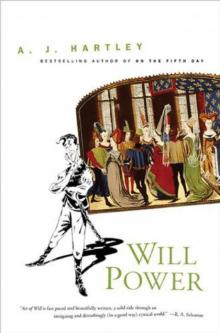 Will Power wh-2
Will Power wh-2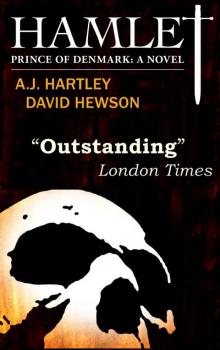 Hamlet, Prince of Denmark
Hamlet, Prince of Denmark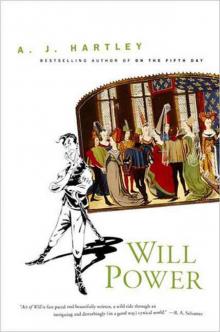 Will Power
Will Power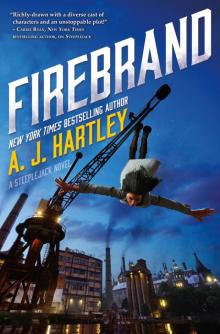 Firebrand
Firebrand A Novel
A Novel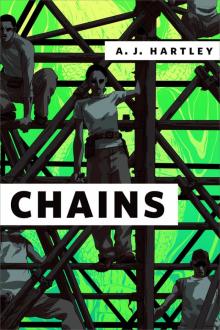 Chains
Chains Guardian
Guardian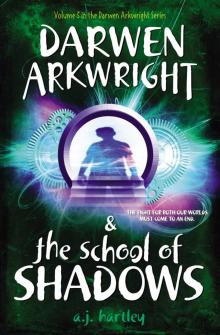 Darwen Arkwright and the School of Shadows
Darwen Arkwright and the School of Shadows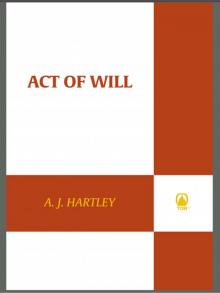 Act of Will
Act of Will Darwen Arkwright and the Insidious Bleck
Darwen Arkwright and the Insidious Bleck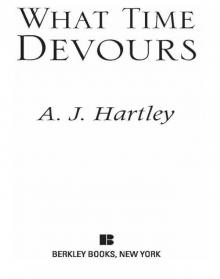 What Time Devours
What Time Devours